Tue 24 Aug 2010
A Review by David L. Vineyard: JOHN D. MacDONALD – The Only Girl in the Game.
Posted by Steve under Authors , Reviews[14] Comments
JOHN D. MacDONALD – The Only Girl in the Game. Gold Medal s1015, paperback original; 1st printing, July 1960. First hardcover edition: Robert Hale, UK, 1962. Reprinted many times.
If there was justice in the world, writers would rise each morning and bow three times in the direction of John D. MacDonald’s grave. If that seems a bit extreme, read this description of a typical night in a Las Vegas casino, better still “listen” to it, its cadences and its rhythms:
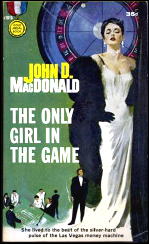
When play was this heavy there was a special electric tension in the air, but there was something dingy about it. There was laughter, but no mirth. This was the raw sweaty edge where luck and money meet in organized torment. Money is equal to survival. So it is as mirthless as some barbaric arena where slaves are matched against beasts. People in casinos ignore each other. It is a place where each man is intensely and desperately alone.
There is a tendency to discuss MacDonald’s work as if he was yet another suspense novelist, and while he wrote some fine suspense novels, I have always thought of him as first and foremost a novelist. His concerns are those of the mainstream of American literature, and while few writers had his skill or ability at creating suspense, what sets him apart from almost every other writer in the field in that novelist’s eye.
His special skill was not only in creating suspense and character but illuminating the darker byways of the everyday world of business and life. His plots and characters intersect at the place where the day to day world of business breaks down and lines are crossed morally and criminally. No one ever took a more jaundiced or more clear eyed view of the morality — and lack of it — of the average American business enterprise, whether it be a Florida real estate deal gone bad, a con game out of control, or the operation of Vegas casinos.
Vegas and its casinos are the perfect milieu for both MacDonald’s savage moral eye and his very human and sometimes morally fragile characters. Hugh Darren, the hero of this novel, is the assistant manager at the Cameroon’s hotel, one of the big casinos. He is ideally suited to his job, a person with a sharp mind, people skills, and a clear eyed view of the world.
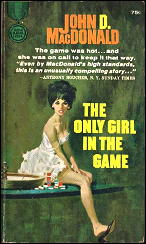
The Cameroon was once the worst run hotel on the strip. Hugh changed all that. But this is a city and a world where success isn’t measured just by results. Sometimes it is measured by whose knife is in your back or at your throat.
Hugh has just run afoul of Max Haines, who runs the casino side of the operation who “knows a lot about how things run around here.” He knows things about their boss Al Marta too, and about secrets the manager of the hotel might not know — or care to know.
Hugh wants to run the hotel at a profit. Max is old school and believes the hotel should lose money to better support the casino, the real source of money. And making sure the margins for the casino stay where they always have been is a job Max does, and boss Al Marta turns his head from, at any cost.
As might be expected, there are two notable examples of MacDonald women in this one. First is Betty Dawson, “a tall brunette with unusually dark blue eyes, and a loveliness of face that was reminiscent of Liz Taylor.” Betty is a singer (“I’ve got no voice and I can’t play much piano …”) who works in one of the hotels rooms and has recently fallen hard for Hugh, the kind of stand up guy she never had in her life before: “We just didn’t have this kind of thing in stock when you first started to trade with us, Betty,” is how she sees it:
Betty also acts as a hostess at the hotel. It’s not exactly prostitution — she doesn’t have to sleep with customers — but she does have to lead them on. She knows who and what she is, she doesn’t yet know what it will cost her beyond what it has already cost, her self respect, and something of her heart and her soul.
But for the time being Betty is the happiest she has been in a long long time, and anyone who has ever read John D. MacDonald should know that excess joy is never a good sign.
Sex is one of MacDonald’s great themes, not only the healing power of good sex, but the destructive dangers of the other kind. He sees it both as a blessing and a curse, a redemption and a damnation. His heroes tend to redeem the women in their lives both with sex and with compassion, but it is never cut and dried.
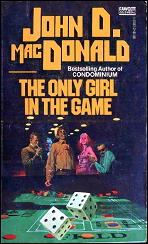
Too much has been made over the redemptive aspect of sex in MacDonald’s books, and not enough perhaps of the awful toll it sometimes takes. Contrary to what some critics like to suggest, a good man is not always enough to save a MacDonald heroine, and even in the McGee books there is a stubborn refusal to allow easy answers.
His heroes are often catalysts in the life of the women in his books, but MacDonald seldom suggests that is enough. It is only one part of healing, one part of life, not everything.
Some critics would do better to actually read MacDonald, rather than simply repeat what they have read about him.
The other MacDonald woman is Vicky Shannard, “… in her thirtieth year, a cuddly dumpling, a pwetty widdle pigeon, a blonde, pink and white, cushiony little cupcake …” who parlayed a history of stripping and living as a professional guest to marriage to Temple Shannard a moneyed older man from New Providence, a golden tongued promoter who operates in the Bahamas and is now in Vegas. But lately their marriage is drifting apart and coming to the Cameroon isn’t going to help.
Vicky is a type MacDonald is never particularly kind to, but he does draw them as they are with due prejudice, but also with an honest eye. She isn’t a monster and Tempe isn’t a victim. They are just people who can’t overcome who and what they are.
At heart John D. MacDonald has the pure American streak of the Calvinist about him. He is attracted to and repelled by the glamour of money and power. Glitter, sin, and easy money bring out the savage in him even as he cannot ignore them or stay away.
All of these people might not create quite so much drama anywhere else, but as Hugh explains to Vicky in a statement that might be the theme of the novel:
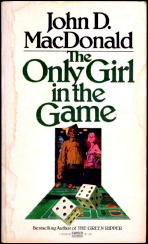
Finally there is Homer Gallowell of Fort Worth, Texas, a figure that appears in many MacDonald novels in many forms. Homer is a canny old coot, a player and an operator, the sane voice of a man who “had the hard bitten look of a man who had spent the first half of his life sleeping on the ground.”
Gallowell is the kind of individualist who MacDonald always champions over the corporate mind of any business enterprise, smart, tough, straight, and sentimental about only two things — good men and women and good booze.
He’s a fairly common figure in business related novels of the fifties and sixties, the last of a breed before buttondown minds accompanied button-down collars, before the bottom line became the moral standard.
Homer has come to Vegas and the Cameroon to beat the house at its own game.
Homer is an old friend of Betty Dawson too, which is why Max Haines thinks she may be able to play him, because Homer is the one thing Vegas fears more than card counters and con-men — an intelligent gambler with enough money to give them a run for their money, to play their odds, and to win. Max had used Betty for this kind of thing before:
“It was as easy as cutting your own throat, Max.”
To give him full credit, MacDonald makes the operations and philosophy of a casino and the machinations of Homer, Max, Al Marta, and Tempe Shannard as suspenseful as any spy novel or bank heist. No one wrote as compellingly about the high pressure world of money and power.
As the strands of the novel tighten into a single skein, the center falls apart as it so often does in MacDonald’s novels. The sham that is Tempe and Vicky’s marriage begins to shatter, Betty’s past begins to catch up with her, and Hugh Darren’s basic morality and honesty is about to come in conflict with Vegas version of the bottom line.
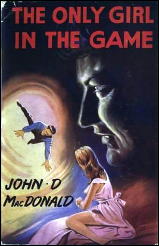
It would not be a good thing to stay in such a place too long, because you might lose the ability to react to any other human being save on the level of estimating how to use them, or how they were going to use you. The impossibility of any more savory relationship was perfectly symbolized by the pink-and-white-and-blue neon crosses shining above the quaint gabled roofs of the twenty-four-hour-a-day marriage chapels.
We are all familiar with MacDonald’s use of color- coded themes, but someone should write a paper on his use of the color pink. He seems to embody all the sins and flaws of the American Dream in the color pink.
The crisis comes when Betty Dawson, her own morality awakened by being asked to play Homer, defies and crosses Max Haines, and through her Hugh Darren faces his own moral and ethical crisis. But when Max and Al push Hugh too far and hit him too hard, he reacts in the true manner of a MacDonald hero and with a little help from Homer …
“Money.”
“And what’s the greatest weapon in the world?”
“Money.”
Hugh and Homer bring down Max Haines and his pals, but at a cost they would neither of them have cared to pay. Some heroines can’t be saved and some dragons are never really slain.
Smoke, shadows, colors, sweat, music, the bare shoulders of lovely women, the posturings of the notorious — and that unending, indescribable, chattering roar of tension and money, I shall never see it again, but I will always know it is going on, without pause or mercy, all the days and nights of my life.
The names have changed, the strip is bigger and gaudier than ever, more a playground and fantasy than ever, but MacDonald’s savage critique remains as true and as well observed as before. No one ever looked harder, longer, or more honestly at the phony sentiment, cruel lies, and emotional paucity of big money and big business.
Whether in the standalone novels or the Travis McGee books, whether writing about crime or business that deteriorates into crime, his great theme was an anger and even grief over the soul-numbing results of wounded people in a society with too few second chances.
MacDonald, in the true tradition of the American novel, and not just the hard-boiled school, still echoes Twain’s Huck Finn at the end of his adventures. “I been there before.” That echoes across American literature, that sense of loss and frustration, that realization that life indeed goes on, and we have all “been there before” and will be there again.
August 24th, 2010 at 9:12 pm
The finest critique of JDM I’ve ever read. Bar none
August 24th, 2010 at 9:21 pm
Ed
Nothing I can say. From you, that’s a hell of a compliment.
Thanks
August 27th, 2010 at 12:28 pm
I’ve read a lot of JDM, but this one slipped past me. I’m on the hunt for a copy now. I agree with Ed, it’s an excellent review.
September 18th, 2010 at 12:43 pm
I always thought, growing up on jdm, that he was able, better than most, to find that point just at the moment where sarcasm becomes cynicism, and to stay there – where there is hope, but just barely.
You too have been there – thanks for the memory.
January 29th, 2011 at 9:15 pm
I’ll bow to no-one in my admiration for JDM and have read virtually all of his stuff a dozen times over.
Your evaluation is spot on and it’s been a privilege to get your insights.
All that said, TOGITG broke my heart and I’ve never cared to re-read it—the only title in the canon that’s had that effect on me.
KS
January 30th, 2011 at 7:13 pm
Ken
I know what you mean. Artistically the book probably had to end that way, but damn, I didn’t want it too.
February 13th, 2011 at 4:51 pm
[spoiler alert RE: On the Run by John D.]
David, you responded to Ken on 30 Jan 11 with:
“Artistically the book probably had to end that way, but damn, I didn’t want it too.”
I agree. And double damn was my feeling when right after Only Girl, I next happened to read On the Run. Which got me wondering about the ratio in JDM’s novels of heroines who get rescued vs. those who tragically do not. Unlike Only Girl, at the end of On the Run, the retribution in store for those behind Paula’s killing is implied, but in such a way that the certainty with which it will be so is left doubtless. (Of additional interest in OTR is the fact JDM uses a strong female character to do the emotional rescuing of a man in dire distress, opposite to how he would have Travis McGee do so – similarly, in large measure, erotically – the decade after OTR was written. (like your site)
February 13th, 2011 at 10:03 pm
JDM also uses a strong woman to save McGee a few times — notably in A DEADLY SHADE OF GOLD — where one of the heroines is also killed. A PURPLE PLACE FOR DYING revolves around McGee avenging the death of a woman he feels he judged too quickly and thus betrayed.
I don’t want to read too much into the death of the heroines in these books. No small percentage of James Bond’s girl friends (secondary ones anyway and some primary) meet a grim fate as well. Arsene Lupin left a number of deceased or at least abandoned lovers behind. Call it the WUTHERING HEIGHTS syndrome. Even Horatio Hornblower’s first wife died, largely so he could marry his true love and to give him something to feel guilty about.
Many heroes have at least one tragic love (if not death) in their careers — D’Artagnan, the Toff (A KNIFE FOR THE TOFF), Dr Palfrey, Dirk Pitt (at least twice), Edmund Dantes, Lew Archer (his failed first marriage), George Smiley (his adulterous wife), Jeremiah Healy’s John Francis Cuddy seemed to spend half his time at his wife’s grave …
There is probably a good paper to be written on the role not of the femme fatale but the fated femme — those fey heroines of so many novels in the genre who die so the hero can assume that Byronic pose of the man with a wound that never heals.
I think, particularly in JDM’s case, his point often was you don’t come out of life unscathed, and when you confront evil (and JDM believed in evil and good) the price is often mortal.
Like Fleming, in the series books he felt killing the heroine once in a while was as close as he could come to making the hero seem mortal. JDM often said that the eroticism of the McGee books was there because McGee couldn’t die — but I think he felt if the hero could not die, at least the heroine could. The reader might know McGee and Meyer were safe, but that was all.
In the non series books JDM usually went where the logic of the plot and the artistry took him. He seldom ‘forced’ a happy ending on a situation he felt could not bear it. GAME is a good example of that where the hero triumphs, but it is a fairly hollow victory. In JDM good men do not so much defeat evil, as survive it — at the most fight it to a draw.
I think he would have agreed with Walter Benjamin who wrote;
“Death is the sanction of everything that the story-teller can tell. He has borrowed his authority from death.”
That is certainly true in the crime and mystery genre where whether it is the fair play mystery, spy novel, suspense novel, romantic suspense, or screwball comedy death is always the sanction for everything written.
March 9th, 2011 at 6:10 pm
to whom’ i have been a jdm fan since i was ayoung man and ialways find myself coming back to his work. as some say you can read it time and time agian and still discover something you may have missed. very good review. dan
April 12th, 2012 at 3:24 pm
I am from Argentina, and have been a fan of JDM for over thirty years, though not many people over here know of him. When I first visited the States I spent a week in Fort Lauderdale as I earned to feel the “McGee beach bum” atmosphere. It was a shock to find out JDM had passed away, and I cried as much as I did when I arrived in Rio just to learn that Vinicius had died a few weeks before. I’m grateful to have read all the above written about him and his work!
April 13th, 2012 at 2:49 pm
Excellent analysis of one of JDM’s best books. It’s shocking that JDM has receded from cultural consciousness in a little more than 20 years. None of my students have read any of his books. A whole new generation has no idea who Travis McGee is.
May 1st, 2015 at 1:24 pm
In his interview with Ed Gorman John D mentions that it took him three attempts to establish a series character he was comfortable with. T McGee was obviously the third, but I surely can’t be the only one who suspects that Hugh Darren in OGITG and the protagonist of On the Run were the first two attempts.
April 17th, 2020 at 5:59 pm
4/17/20 JDMacDonald’s “Cinnamon Skin” (Travis McGee series) is “Dedicated to our special group of Kiwis, with love”. Maynard, the son, lives in New Zealand – kiwi land, along w/Australia. Does anyone know what the dedication refers to? This is next-to-last of McGee books… And did JDMacD. write “The Official Travis McGee Quizbook” or someone else? and what of it? What kind of a chap is Maynard? I think the drawings of McGee’s face might fairly resemble what John MacDonald could have looked like in his youth, only speaking of the face. Now someone tell me I’m way off in thinking this. Later in life, am reading his McGee books. My first husband used to be carrying one or another of them under his arm most of the time when we lived in Miami for 25 years, from 1962 on and while Mr. MacDonald lived on the FL west coast. MacDonald’s Irish, ain’t it? I’m partly a Scottish McDonald.
September 24th, 2020 at 2:28 pm
[…] Hugh Pickens provided a link to a nicely written review of this nicely written story, commenting that he had never seen two of […]